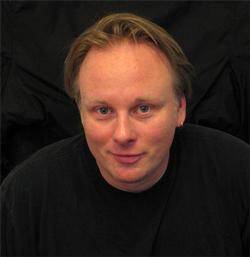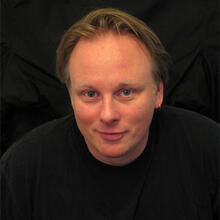As a faith-sharing group, I’m not sure it would pass muster. In fact, the members of our ad hoc assembly—all three of us—don’t even share the same faith. And yet every month our trio—a rabbi, a Jewish painter and a Catholic musician—gathers for breakfast in Brooklyn and talks about God.
It sounds like the start of a bad joke—admittedly, we look out of place at Le Pain Quotidien in Park Slope surrounded by mothers and baby carriages—but our get-togethers are among the most profound fellowship experiences I’ve had. I don’t understand exactly why that is, but I think it involves the fact that each of us is uniquely uncomfortable in our chosen vocations precisely because we feel compelled to talk about God in the first place. We are bound together by stubborn persistence and willful irrelevance.
Rabbi Dan Ain, 37, is the director of tradition and innovation at New York’s 92nd Street Y, a 140-year-old Jewish cultural institution. We met years ago when he asked me to speak at a Shabbat on Tap series about “The G-d I Believe In.” It was a great evening of conversation in a bar with a very smart group in Lower Manhattan. After a while it was pretty clear, though, that Dan and I were the only people present who actually believed in “G-d.” We were chock-full of Jewish psychologists, psychoanalysts and people in the arts, but the clearest statement of faith I heard was from one participant who identified as a “non-theist” instead of an atheist.
This confounded me until Dan told me a story about a respected rabbi he studied with at Jewish Theological Seminary who had escaped from Poland but lost his family in the Holocaust. Dan asked him how he could endure so much and yet continue, at an advanced age, to show up at the seminary everyday to study Scripture and commentary alone in the basement. “There are three pillars in Judaism: God, Torah and Israel” the rabbi explained. “I love Torah. I’ve spent my whole life studying and debating Scripture. I love the Jewish people (Israel). I love our history, our traditions. God? Well, two out of three ain’t bad.”
For Christians, the notion of religion without God simply doesn’t compute, but it is a reality that Dan deals with every day. Creating that missing conversation about God—especially among the legions of younger, unaffiliated Jews—is what motivated Dan, a Boston College Law graduate, to leave his legal career after Sept. 11 and become a rabbi.
I met Archie Rand in 2008 when I went to see “The 613,” his enormous work (100 ft. by 22 ft.), made up of 613 separate paintings, that hung in a Brooklyn warehouse. Each painting illustrates one of the 613 commandments of traditional Judaism done in the bold colors and style of EC comics from the 1950s. As I stood there, overwhelmed at the site, Archie confessed astonishment that anyone actually cared about this sort of work.
Born in Brooklyn, Archie was an art prodigy who had his first solo New York show in the mid 1960s at age 16. He was around for Warhol’s Factory and the legendary Max’s Kansas City. Reviewed everywhere, his works are in over 400 public collections, like the Met, MoMA and the Whitney. But when Archie—a nonobservant Jew—began creating non-ironic, explicitly Jewish-themed paintings in the early 70s, the silence was deafening. “The only people who care are Catholics” he said. “Jews—secular and religious—don’t know what to make of it. As far as the contemporary art world, forget it.”
Though he’s in an artistic wilderness of his own choosing, Archie believes an artist’s work needs to serve something greater than the self. “After 50 years of irony and cynicism,” he has said about contemporary art, “it would be good to tackle gratitude.” This is how he conceives of God—as a place to direct our thankfulness. “Our gratitude needs an address” he tells Dan and me. Then he laughs self-deprecatingly and says, “You realize this is an incredibly uncool conversation that no one outside of the three of us even cares about?”
I’m not so sure he’s right, but I am certain that, as we look for a location to direct our gratitude this Passover and Easter, part of mine will be addressed to that place in Brooklyn with the French name for “daily bread” where my unorthodox faith-sharing group offers its own form of communion.








